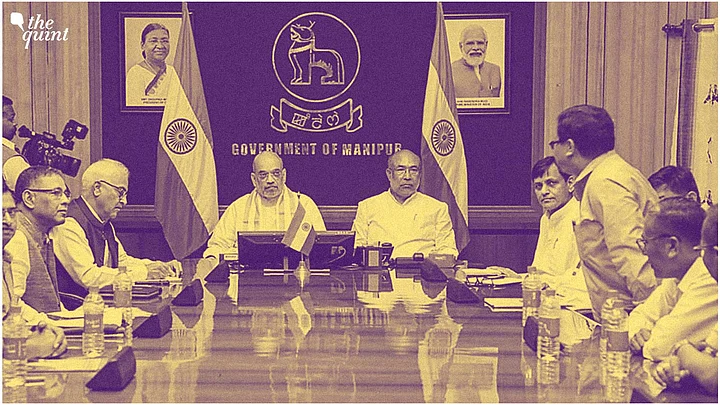Manipur has been raging in ethnic violence for more than two months now. At least 140 people have died and 70,000 are displaced, and the politics behind the violence has paralysed the country’s Parliament.
Yet, under India’s system of government, there exists no institutional structure to bring any guilty political leaders to account or punish their cronies. What’s worse is that there is no framework in place to ensure that, even after it subsides, such ethnic violence won’t break out again.
These failings are not limited to Manipur, but exist in all Indian states and at the Centre, because our parliamentary form of government is not equipped for such a diverse population as ours.
Take the fundamental parliamentary principle of majority rule: those in the majority run the government. The Manipur violence is between the Meitei majority (53 percent of the population) and the Kuki minority (28 percent). The Meiteis control 40 of the 60 seats in the state legislature, but Kukis have only 10 MLAs.
The Hindu-leaning Meiteis brought the BJP government to power in March 2022 with a majority of 32 seats; six months later it added five more from defections. When one ethnic community has such a dominant majority, who is to safeguard the interests of the minority?
Winner-takes-all Governments
The parliamentary system makes this even worse when it gives the leader of the majority a free hand in picking ministers, for this often creates a sectarian government. The Chief Minister of Manipur is a Meitei, and he handpicked loyalists and cronies as ministers. His administration became so authoritarian that nine Meitei MLAs – eight from the BJP itself – went to the Prime Minister in June 2023 to caution that the “public has lost complete faith in the present state government.”
But an Indian parliamentary government, no matter how sectarian or partisan, can be held accountable only in the next general election. And of course, the majority in the legislature never wants to throw itself out of office.
This mixture of majority rule and a sectarian government becomes lethal in a diverse democracy like India when a CM is handed all executive and legislative powers. Our parliamentary system creates winner-takes-all governments with all authority given to one individual.
It’s no wonder that the Manipur CM took ethnically charged decisions without seeking support in the legislature. He announced the granting of tribal status to the Meiteis, but the Kukis saw that as an attempt to grab their tribal lands. He started a war on drugs, but to the Kukis, it was a screen to uproot their communities. He promoted Meitei customs, but the Kukis felt threatened and left out of their Christian beliefs.
A parliamentary CM has the power to pass any law, appoint any official, and act as he chooses. The entire state machinery, including the investigative agencies and police, report only to him. As former Justice of the Supreme Court Madan Lokur wrote, “The authorities who chose not to act despite knowing about the horrors in Manipur too are guilty, but who will hold them to account?”
Our Parliament Constitutes Only Ruckus and Speeches
In the past, India’s president had the authority to hold a state government to account. But Indira Gandhi’s 42nd Amendment put an end to that. She amended the Constitution so that a President must now act as advised by the PM. This removed the only nonpartisan check in India’s system on central and state governments.
Now, the president is subservient to the PM, and state Governors are mostly powerless. Under this constitutional setup, the PM is under no obligation to impose President’s Rule in Manipur and dismiss a government of his own party.
As for the judiciary, it is not designed to check the executive and legislative branches but to adjudicate laws. At best, it can declare a law unconstitutional.
As India’s Chief Justice DY Chandrachud recently observed about the petitions made by the Kuki community, "This is not the platform where we do this. We should be conscious of the remit of the Supreme Court. We cannot run the law and order, elected government does." Besides, our system of appointing judges is terribly opaque. Credible reports allege that the Manipur CM delayed the appointment of the Chief Justice of the state’s High Court.
So, without any recourse at the state level, the matter has reached Parliament. But this only politicizes a grave crisis. Under our parliamentary system, the opposition has no teeth, hence it only makes ruckus and speeches.
Its no-confidence motion is bound to fail because PM Modi has a solid majority in Parliament. In India’s 75-year history only one government has resigned (V P Singh in 1990) due to a defeat in a no-confidence motion. As for the CBI’s investigation of crimes committed in Manipur, the results will always be suspect, given that both central and state governments belong to the same party.
A tragic over-centralisation of power is inherent in our parliamentary system, allowing all our chief executives to be dangerously authoritarian. If India wishes for a brighter future, we must fix this basic flaw in our Constitution.
(The author is Founder and CEO of the Divya Himachal group and author of ‘Why India Needs the Presidential System’. He can be reached @BhanuDhamija. This is a personal blog and the views expressed above are the author’s own. The Quint neither endorses nor is responsible for the same.)
